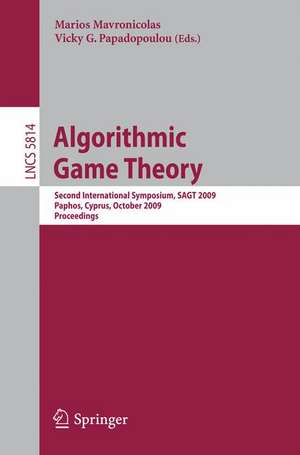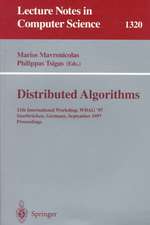Algorithmic Game Theory: Second International Symposium, SAGT 2009, Paphos, Cyprus, October 18-20, 2009, Proceedings: Lecture Notes in Computer Science, cartea 5814
Editat de Marios Mavronicolas, Maria Papadoupoulouen Limba Engleză Paperback – 23 sep 2009
Din seria Lecture Notes in Computer Science
- 20%
 Preț: 1061.55 lei
Preț: 1061.55 lei - 20%
 Preț: 307.71 lei
Preț: 307.71 lei - 20%
 Preț: 438.69 lei
Preț: 438.69 lei - 20%
 Preț: 579.30 lei
Preț: 579.30 lei -
 Preț: 410.88 lei
Preț: 410.88 lei - 17%
 Preț: 427.22 lei
Preț: 427.22 lei - 20%
 Preț: 596.46 lei
Preț: 596.46 lei - 15%
 Preț: 448.04 lei
Preț: 448.04 lei - 20%
 Preț: 353.50 lei
Preț: 353.50 lei -
 Preț: 389.49 lei
Preț: 389.49 lei - 20%
 Preț: 309.90 lei
Preț: 309.90 lei - 20%
 Preț: 645.28 lei
Preț: 645.28 lei - 20%
 Preț: 763.23 lei
Preț: 763.23 lei - 15%
 Preț: 580.46 lei
Preț: 580.46 lei - 20%
 Preț: 310.28 lei
Preț: 310.28 lei - 20%
 Preț: 655.02 lei
Preț: 655.02 lei - 20%
 Preț: 1183.14 lei
Preț: 1183.14 lei - 20%
 Preț: 340.32 lei
Preț: 340.32 lei -
 Preț: 449.57 lei
Preț: 449.57 lei - 20%
 Preț: 591.51 lei
Preț: 591.51 lei - 18%
 Preț: 938.83 lei
Preț: 938.83 lei - 20%
 Preț: 337.00 lei
Preț: 337.00 lei - 20%
 Preț: 649.50 lei
Preț: 649.50 lei - 20%
 Preț: 607.40 lei
Preț: 607.40 lei - 20%
 Preț: 1414.79 lei
Preț: 1414.79 lei - 20%
 Preț: 1024.44 lei
Preț: 1024.44 lei - 20%
 Preț: 583.40 lei
Preț: 583.40 lei - 20%
 Preț: 453.32 lei
Preț: 453.32 lei - 20%
 Preț: 575.49 lei
Preț: 575.49 lei - 20%
 Preț: 1075.26 lei
Preț: 1075.26 lei - 20%
 Preț: 585.88 lei
Preț: 585.88 lei - 20%
 Preț: 825.93 lei
Preț: 825.93 lei - 17%
 Preț: 360.20 lei
Preț: 360.20 lei - 20%
 Preț: 763.23 lei
Preț: 763.23 lei - 20%
 Preț: 340.32 lei
Preț: 340.32 lei - 20%
 Preț: 504.58 lei
Preț: 504.58 lei - 20%
 Preț: 369.13 lei
Preț: 369.13 lei - 20%
 Preț: 580.93 lei
Preț: 580.93 lei - 20%
 Preț: 343.62 lei
Preț: 343.62 lei - 20%
 Preț: 350.21 lei
Preț: 350.21 lei - 20%
 Preț: 583.40 lei
Preț: 583.40 lei - 20%
 Preț: 583.40 lei
Preț: 583.40 lei - 15%
 Preț: 438.59 lei
Preț: 438.59 lei - 20%
 Preț: 341.95 lei
Preț: 341.95 lei - 20%
 Preț: 238.01 lei
Preț: 238.01 lei - 20%
 Preț: 538.30 lei
Preț: 538.30 lei
Preț: 337.85 lei
Preț vechi: 422.31 lei
-20% Nou
Puncte Express: 507
Preț estimativ în valută:
64.67€ • 70.27$ • 54.36£
64.67€ • 70.27$ • 54.36£
Carte tipărită la comandă
Livrare economică 21 aprilie-05 mai
Preluare comenzi: 021 569.72.76
Specificații
ISBN-13: 9783642046445
ISBN-10: 3642046444
Pagini: 365
Ilustrații: XI, 359 p.
Dimensiuni: 155 x 235 x 23 mm
Greutate: 0.57 kg
Ediția:2009
Editura: Springer Berlin, Heidelberg
Colecția Springer
Seriile Lecture Notes in Computer Science, Theoretical Computer Science and General Issues
Locul publicării:Berlin, Heidelberg, Germany
ISBN-10: 3642046444
Pagini: 365
Ilustrații: XI, 359 p.
Dimensiuni: 155 x 235 x 23 mm
Greutate: 0.57 kg
Ediția:2009
Editura: Springer Berlin, Heidelberg
Colecția Springer
Seriile Lecture Notes in Computer Science, Theoretical Computer Science and General Issues
Locul publicării:Berlin, Heidelberg, Germany
Public țintă
ResearchCuprins
Monotonicity in Mechanism Design.- Computational Aspects of Equilibria.- A Modular Approach to Roberts’ Theorem.- Characterizing Incentive Compatibility for Convex Valuations.- Truthful Mechanisms for Selfish Routing and Two-Parameter Agents.- Partition Equilibrium.- Better with Byzantine: Manipulation-Optimal Mechanisms.- On the Planner’s Loss Due to Lack of Information in Bayesian Mechanism Design.- Sequential Pivotal Mechanisms for Public Project Problems.- Characterizing the Existence of Potential Functions in Weighted Congestion Games.- Free-Riding and Free-Labor in Combinatorial Agency.- The Cost of Stability in Coalitional Games.- Non-clairvoyant Scheduling Games.- The Balloon Popping Problem Revisited: Lower and Upper Bounds.- Anarchy, Stability, and Utopia: Creating Better Matchings.- Equilibria in Dynamic Selfish Routing.- Stochastic Stability in Internet Router Congestion Games.- Nash Dynamics in Constant Player and Bounded Jump Congestion Games.- Price of Stability in Survivable Network Design.- Games with Congestion-Averse Utilities.- A New Derandomization of Auctions.- The Computational Complexity of Weak Saddles.- Learning and Approximating the Optimal Strategy to Commit To.- Doing Good with Spam Is Hard.- On Profit-Maximizing Pricing for the Highway and Tollbooth Problems.- On the Complexity of Iterated Weak Dominance in Constant-Sum Games.- Swap Bribery.- Performances of One-Round Walks in Linear Congestion Games.- Nash Equilibria and the Price of Anarchy for Flows over Time.- Bayesian Auctions with Friends and Foes.- On Equilibria for ADM Minimization Games.
Textul de pe ultima copertă
This book constitutes the refereed proceedings of the Second International Symposium on Algorithmic Game Theory, SAGT 2009, held in Paphos, Cyprus, in October 2009.
The 29 revised full papes presented together with 3 invited lectures were carefully reviewed and selected from 55 submissions. The papers are intended to cover all important areas such as solution concepts, game classes, computation of equilibria and market equilibria, algorithmic mechanism design, automated mechanism design, convergence and learning in games, complexity classes in game theory, algorithmic aspects of fixed-point theorems, mechanisms, incentives and coalitions, cost-sharing algorithms, computational problems in economics, finance, decision theory and pricing, computational social choice, auction algorithms, price of anarchy and its relatives, representations of games and their complexity, economic aspects of distributed computing and the internet, congestion, routing and network design and formation games and game-theoretic approaches to networking problems.
The 29 revised full papes presented together with 3 invited lectures were carefully reviewed and selected from 55 submissions. The papers are intended to cover all important areas such as solution concepts, game classes, computation of equilibria and market equilibria, algorithmic mechanism design, automated mechanism design, convergence and learning in games, complexity classes in game theory, algorithmic aspects of fixed-point theorems, mechanisms, incentives and coalitions, cost-sharing algorithms, computational problems in economics, finance, decision theory and pricing, computational social choice, auction algorithms, price of anarchy and its relatives, representations of games and their complexity, economic aspects of distributed computing and the internet, congestion, routing and network design and formation games and game-theoretic approaches to networking problems.













